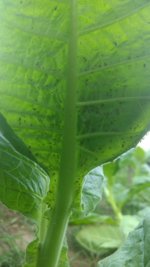Definitely aphids.
If you have a relatively small number of plants with aphids, then dish detergent in water (I use a few drop of Dawn in 4 ounces of water),
if sprayed directly on the aphids, will cause them to desiccate in the sunshine. There is no residual effect, and aphids not directly sprayed will not be affected. Spraying is required every few days.
This year, I used an imidacloprid preparation mixed into my transplant water--at the time of transplant. When properly used, the imidacloprid maintains a low concentration in plant tissues for
most of the growing period, and is nearly absent from the blossoms. I have no qualms about it, with regard to tobacco. I still see aphids and flea beetles, but they don't survive and multiply.
If aphids remain on your tobacco, the leaf will cure normally. After kilning, the dead aphids are still there. They can be easily brushed off the finished leaf with your fingertips, BUT it's a major pain in the butt. High concentrations of aphids on tobacco produce "honeydew," which is a sticky, sweet excretion. Honeydew on cured leaf increases the probability of mold, since it is an excellent growth medium for mold. It's still sticky after kilning.
In the past, I have found that the dish detergent approach works fairly well on varieties of tobacco that have wide spacing between the leaf nodes--allowing access to the spray. For shorter varieties with huge leaves, like Swarr-Hibshman, Dutch (Ohio), Long Red, etc., it's simply not possible to adequately spray them. After years of frustration with beautiful, finished leaf that was covered in tiny dead aphid bodies, I decided to give imidacloprid a try. But it really has to happen at transplant time.
At this point in the season, you can try a spray of permethrin, which will definitely kill the aphids, and has some residual effect. It is mostly gone after a week or two. Permethrin is
relatively non toxic to humans (you can buy clothing pre-treated with permethrin), but should not be used near bee-pollinated blossoms, like veggies.
SUMMARY:
- Dish soap solution works, but is labor intensive
- My limit to using dish soap was about 150 plants
- Dish soap can't reach the aphids on certain varieties
- Imidacloprid should be applied at transplant to be effective
- Topical, sparing use of permethrin will knock down the aphid burden
- Aphids make me crazy
Bob
EDIT: Don't spray soapy water on a sunny day, since it may scald the leaf. Evening is the best time to spray.



